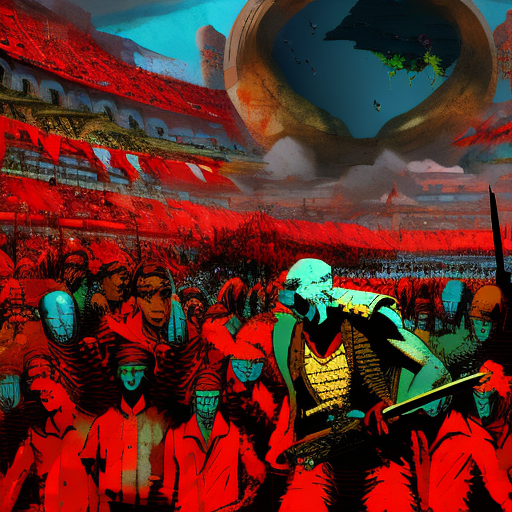One-line Summary:
In Terry Pratchett’s “Jingo,” tensions rise between the city of Ankh-Morpork and the island of Klatch, leading to a satirical exploration of nationalism, war, and the absurdity of conflict.
The Rising Tensions
In “Jingo,” Terry Pratchett introduces us to the city of Ankh-Morpork, a bustling metropolis on the Discworld. The story begins with the discovery of a long-lost island, Leshp, which reappears in the Circle Sea. This sudden emergence sparks a territorial dispute between Ankh-Morpork and the nearby island of Klatch. As tensions escalate, both nations prepare for war, driven by nationalistic fervor and misguided patriotism.
The Absurdity of Conflict
Pratchett uses humor and satire to highlight the absurdity of war and the irrationality of nationalistic pride. Through his witty narrative, he exposes the futility of conflict and the destructive consequences it brings. As Ankh-Morpork and Klatch engage in a war of words and weapons, Pratchett challenges the notion of “us versus them” mentality, showing how it often leads to unnecessary violence and suffering.
The Power of Diplomacy and Understanding
Amid the escalating tensions, a group of characters emerges as voices of reason, advocating for diplomacy and understanding. Commander Vimes, the protagonist, finds himself caught in the middle of the conflict, torn between his duty as a police officer and his desire to prevent bloodshed. With the help of his diverse group of allies, including the irreverent inventor Leonard of Quirm and the formidable Lady Sybil Ramkin, Vimes seeks to find a peaceful resolution to the crisis.
As the story unfolds, Pratchett skillfully weaves together political intrigue, social commentary, and fantastical elements. He explores themes of racism, cultural misunderstanding, and the manipulation of public opinion. Through his sharp observations and clever wordplay, Pratchett invites readers to reflect on the absurdities of their own world and the dangers of blind nationalism.
Key Takeaways:
- War and conflict often arise from misunderstandings and the manipulation of public opinion.
- Nationalistic pride can blind individuals to the humanity of others and lead to unnecessary violence.
- Diplomacy and understanding are powerful tools in resolving conflicts and preventing bloodshed.
“It’s not worth doing something unless someone, somewhere, would much rather you weren’t doing it.” – Terry Pratchett, Jingo
In conclusion, Terry Pratchett’s “Jingo” is a satirical exploration of nationalism, war, and the absurdity of conflict. Through his humorous narrative, Pratchett challenges the reader to question the destructive nature of blind patriotism and highlights the power of diplomacy and understanding in resolving conflicts. “Jingo” serves as a reminder that the absurdities of war and nationalism are not confined to the pages of fiction but are prevalent in our own world as well.












